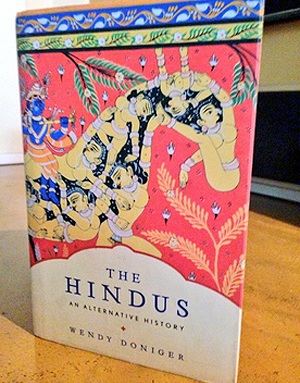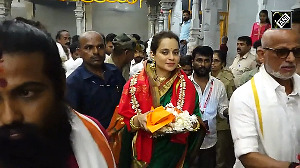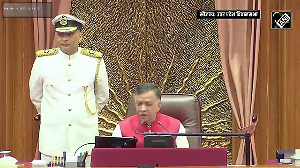 Wendy Doniger's book was NOT banned. There were NO book burnings. There were NO riots. The author was NOT sent death threats. On the contrary, the plaintiffs pursued due process. The case is a textbook example of how to proceed with civilised, democratic dissent, argues Rajeev Srinivasan.
Wendy Doniger's book was NOT banned. There were NO book burnings. There were NO riots. The author was NOT sent death threats. On the contrary, the plaintiffs pursued due process. The case is a textbook example of how to proceed with civilised, democratic dissent, argues Rajeev Srinivasan.
The discussion on social media and in the mainstream media about Wendy Doniger and her book The Hindus: An Alternative History has tended to focus on a single issue: Whether Doniger's freedom of expression had been violated when her publisher, Penguin India, decided to withdraw the book from circulation (only in India).
Of course, the book remains available on shelves outside India, and also in e-book form on the Internet, so anyone in India who wants to access it can feel free to use those channels.
There is an intriguing question as to what 'Freedom of expression' a non-Indian is entitled to in India. Not being a lawyer, I don't know, but an educated guess is that, in fact, a foreigner is entitled to no such freedom as an explicit guarantee in the Constitution or the criminal or civil codes; however, that there are commonly accepted guidelines that most nations (except authoritarian ones) may follow in the spirit of reciprocity.
These may mean that, in practice, a foreigner gets as much freedom of speech as a citizen. But we will leave that question aside for the moment.
The point I wish to emphasise, though, is that there is much disinformation and misinformation floating about, especially in the heat of debate, about what happened. It may be better to consider what did not happen: The book was NOT banned. There were NO book burnings. There were NO riots. The author was NOT sent death threats. In fact, there was none of the fanfare or theatrics that usually accompanies censorship.
On the contrary, the plaintiffs pursued due process. They went to court. I wish to emphasise that: They went to court, and following a truly democratic protest mechanism, filed a suit claiming (among other things) that they were offended, and their religious sentiments were hurt.
The court considered the suit, but before it could announce a verdict, the parties came to a peaceful, negotiated, out of court settlement. I believe the word you are searching for is 'civilised'.
So whose rights were violated? The defendants -- the author and the publisher -- could (and probably did) hire the most outstanding lawyer they could afford, and they argue their case based on Indian law.
The plaintiffs could (and probably did) argue their case. The defendants could have waited for the court to give its verdict (which may well have favoured them). But they did not, and settled out of court. They may have thought they would lose the case. Or they may have felt there was commercial value in withdrawing the book and pulping unsold copies. And so they did.
So where is the compulsion? Isn't this the free market, and democratic protest?
I will not dwell on this, but there have been other cases in India where the clarion call 'Freedom of expression in danger' was heard (or in some cases, not). There were also riots, death threats, physical assaults, book burnings, and all sorts of other dramatic effects. But in this case, there was none. Isn't that a remarkable achievement?
There is also the argument that 'Freedom of expression' is never absolute. In 1999, I argued in my column The Problem with Fire that the film of the same name violated the principle that those who wish to exercise that freedom were also obliged to act with responsibility, so that they did not cause serious problems.
For instance, even though you have every right to shout 'Fire' in a crowded theatre, you also have the responsibility to not do so, as it could cause a stampede. Thus, one has to exercise freedoms with responsibilities. As someone who likes to express his opinion in writing, I could never condone censorship, but I also accept that it must be responsible.
Furthermore, nowhere in the world is hate speech protected. Even the US, with its cherished First Amendment, will seldom condone hate speech -- I have seen people with extreme opinions being physically restrained from expressing them. It could be argued, and it has been, that Wendy Doniger, an American, has stepped over the border from 'free speech' to 'hate speech'. A petition circulated on the Web laid out that case.
You might argue that the relevant Indian laws, specifically the Indian Penal Code Sections 153A and 295A, reproduced below, are not good laws. I might even agree with you on that, because they are vague, and rather draconian.
153A. Whoever (a) by words, either spoken or written, or by signs or by visible representations or otherwise, promotes or attempts to promote, on grounds of religion, race, place of birth, residence, language, caste or community or any other ground whatsoever, disharmony or feelings of enmity, hatred or ill-will between different religious, racial, language or regional groups or castes or communities, or (b) commits any act which is prejudicial to the maintenance of harmony between different religious, racial, language or regional groups or castes or communities, and which disturbs or is likely to disturb the public tranquility... shall be punished with imprisonment which may extend to three years, or with fine, or with both.[3]
295A/ Whoever, with deliberate and malicious intention of outraging the religious feelings of any class of [citizens of India], [by words, either spoken or written, or by signs or by visible representations or otherwise], insults or attempts to insult the religion or the religious beliefs of that class, shall be punished with imprisonment of either description for a term which may extend to [three years], or with fine, or with both.[4]
But if you disagree with the laws, there is a democratic process to change them: So you should pursue it. So long as they are on the statute books, they can be enforced, even though you may not like it. Them, as they say, is the breaks.
One of the things that Hindus have seldom realised in India is that these laws exist, and they have teeth. Personally, I think these are bad laws, and not in keeping with the civilisational ethos of the nation, but I have no choice but to respect them.
To focus on the religious aspect for a moment, these laws make sense only in an Abrahamic environment, where the Semitic religions, all of which are exclusive, and believe themselves to be only truth, and therefore oppress those who are not adherents.
In India, religious oppression became an issue only after the advent of Abrahamic invaders. Prior to their arrival, religious arguments were settled by debate (almost never, with perhaps two exceptions -- one Sasanka in Bengal, and the other a Kashmiri king -- by force) in 5,000 years.
In debate, the loser lost nothing more than that s/he had to join the winner's religion (as was the case in Sankara's famous debates). Thus, these rules are somewhat senseless in India, and are part of the excessive pandering to 'religious minorities' (another senseless term, but outside our scope here) that is routine in India.
And the 'religious minorities' have made very fine use of these laws. They have a clear modus operandi, as was once explained to me by an apostate. If offended (and they are easily offended), one lot resorts to violence, including riots, death threats, and other such.
Another lot will hold a large peaceful march, shouting slogans. Both these are designed to (and will) induce the application of 295A and/or 153A, and the poor devil accused of 'offending' certain tender sensitivities will be frog-marched off to jail.
This happens with monotonous frequency: All of us know of many instances. But if a Hindu has a similar problem, he does not understand the modus operandi. He may riot, which brings down the full force of the State upon him, not to mention the opprobrium of the self-proclaimed liberal defenders of free speech. Even if he organises a peaceful march, the State will ignore him, and the media will abuse him, for they do not believe he has the right to be offended.
The only person up until now who has figured out that Hindus can also use existing laws in their favour is Subramanian Swamy, the maverick economist and former minister. He used legal arguments earlier to nix the destruction of the Rama Setu; more recently, in a precedent-setting case, he managed to prevent the grasping State from grabbing yet another Hindu temple, the Chidambaram Nataraja temple, from the Dikshitar community.
And now comes Dina Nath Batra with his fully democratic victory in the Doniger case. The only lesson that Hindus need to take away is that they, too, are protected under the 'hurt sentiments' law and that they can use it to punish those who offend them.
I hope many more will now use the full force of the law to bring culprits to heel. No need to hang your heads in shame even if soi-disant intellectuals say you must, as you have simply used civilised, democratic dissent.










 © 2025
© 2025